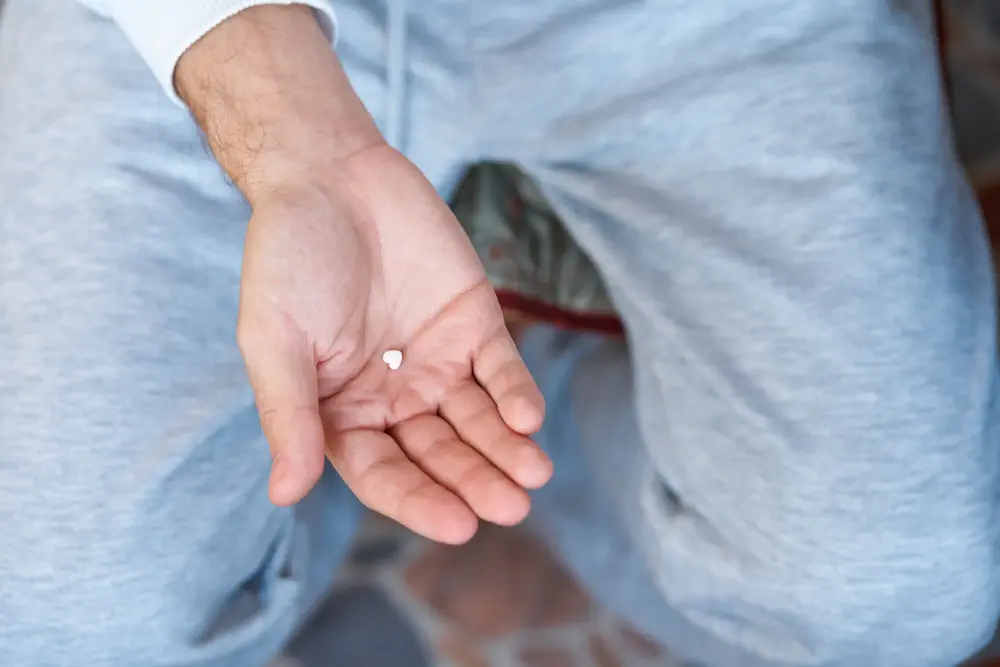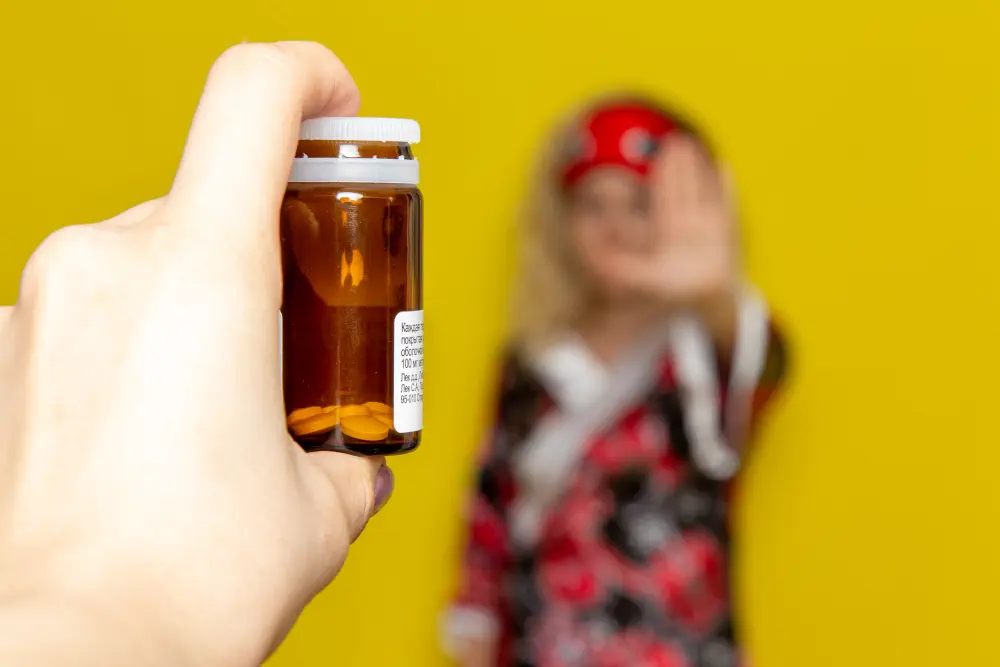We offer medical detox and multiple addiction treatment options in our
luxury treatment centres in Port Hope, Cobourg, and Ottawa.
What Happens During Venlafaxine Withdrawal?
Electric jolts shooting through your skull. Nausea that hits out of nowhere. A head that feels like it's buzzing with electrical storms. These bizarre symptoms can appear within hours of missing a single dose of venlafaxine.
Across Canada, thousands of people rely on venlafaxine to manage depression, anxiety, and nerve pain. This medication transforms lives and pulls people out of debilitating mental health crises. But stopping venlafaxine creates venlafaxine withdrawal challenges that blindside most patients and their families.
Venlafaxine withdrawal hits fast and hard. Those weird brain jolts are real medical symptoms, not imagination. Getting off this medication safely usually requires medical help. Most people feel better within weeks, but everyone's different.
Key Takeaways
- Timeline: Venlafaxine withdrawal symptoms start within hours and typically last several weeks, with the worst period during the first week
- Brain Zaps: Those electric shock sensations in your head are real medical symptoms, not imagination, and they're temporary but harmless
- Medical Supervision: Getting off this medication safely almost always requires professional guidance and gradual tapering
- Not Addiction: Experiencing withdrawal doesn't mean you're addicted - it's normal physical dependence that happens to most long-term users
- Individual Variation: Everyone's experience differs based on dose, duration of use, and personal factors - some recover quickly, others need months

Why Stopping Venlafaxine Feels So Rough
Venlafaxine works by jamming up your brain's recycling system. Your brain produces mood chemicals called serotonin and norepinephrine. Normally, these chemicals do their job, then get cleaned up and reused.
Venlafaxine blocks the cleanup crew. Extra mood chemicals stick around longer. You feel better because more of the good stuff stays active in your brain.
Here's the catch: your brain notices all these extra chemicals floating around. So it slows down making its own. Why work overtime when someone else is doing the job?
This is called neuroadaptation. It happens to everyone taking venlafaxine for more than a few weeks.
When you stop the medication, trouble starts. Those backup chemicals vanish overnight. But your brain's natural production is still turned way down. You're stuck in a chemical shortage until your brain figures out how to make enough on its own again.
Venlafaxine disappears from your system incredibly fast. Other antidepressants hang around for weeks. Venlafaxine? Gone in hours. This quick exit explains why withdrawal symptoms slam into people so suddenly.
Important point: venlafaxine withdrawal doesn't mean you're addicted. Your body adapted to the medication - that's normal biology. Venlafaxine addiction involves compulsive drug-seeking behavior despite harm. That's rare with prescribed antidepressants.
The Venlafaxine Withdrawal Timeline
First Day: Warning Shots
Miss a dose and subtle changes start within hours. You might feel emotionally thin-skinned. Concentration wavers. Tasks that usually feel automatic suddenly require extra brain power.
Many people brush off these early signs. Stress, right? Poor sleep? Maybe. But if you're planning to stop venlafaxine, this is your brain sending up the first flares about impending venlafaxine withdrawal.
Days One to Three: The Real Deal
True venlafaxine withdrawal announces itself fast. The symptoms fool people because they mimic a nasty flu.
Your head pounds. Muscles ache everywhere, especially your neck and shoulders. Nausea hits hard - some people can't keep food down. You might shake or feel unsteady walking around.
Sleep becomes a joke. You're exhausted but can't fall asleep. When you do sleep, vivid nightmares wake you up multiple times. Night sweats are common.
Week One: The Worst of It
The first week tests everything you've got. Brain zaps fire constantly - sometimes dozens per day. Moving your eyes sideways triggers them. Turning your head fast sets them off. Sometimes they just happen.
Emotionally, you're a mess. Tiny frustrations trigger huge anger outbursts. You feel like you have zero patience left for anything. Many people describe it as having no emotional shock absorbers.
Your thinking gets cloudy. Reading becomes hard work. Following conversations takes extra effort. You might forget common words mid-sentence.
Anxiety can go through the roof. Not just worry - full-body panic with racing heart, sweating, and that feeling like something terrible is about to happen.
Recovery: Weeks Two and Beyond
Things usually start improving in week two. It's not a straight line though. You might have a decent day followed by two rough ones. That's normal.
Physical stuff typically gets better first. Headaches fade. Muscle aches disappear. Sleep slowly returns to normal, though weird dreams might stick around longer.
Brain zaps decrease but can linger for weeks. The good news is they become less scary once you understand what they are.
Your emotions gradually stabilize. That explosive irritability softens. Anxiety levels drop, though some ups and downs continue.
Complete recovery varies wildly. Some people feel normal in weeks. Others deal with lingering effects for months, especially if they took high doses for a long time.

Recognizing Venlafaxine Withdrawal Symptoms
Brain Zaps: The Signature Move
No other medication creates brain zaps quite like venlafaxine. People struggle to describe them. Brief electrical shocks. Lightning bolts in your skull. Buzzing sensations. Feeling temporarily "unplugged."
They last less than a second but happen constantly during bad venlafaxine withdrawal. Many people develop specific triggers: quick eye movements, sudden head turns, standing up fast, stress.
Some people hear sounds with the zaps - whooshing, crackling, or actual zapping noises inside their head. Others feel momentarily confused or disconnected from reality.
Brain zaps sound scary but they're harmless. No brain damage. No lasting problems. They're temporary electrical hiccups as your brain chemistry rebalances.
Moving slowly helps. Avoid rapid eye movements when possible. Stay hydrated. The zaps will fade as withdrawal improves.
Physical Symptoms Nobody Warns You About
Venlafaxine withdrawal hits your whole body, not just your brain. These effects differ significantly from regular venlafaxine side effects that people experience while taking the medication.
Your stomach goes haywire. Beyond nausea, you might lose your appetite completely or crave strange foods. Cramping, diarrhea, and constipation can flip back and forth. Food might taste metallic or just wrong.
Heart symptoms worry people. Palpitations, blood pressure swings, feeling like your heart races during normal activities. Usually temporary but frightening if you don't expect them.
Your senses get hypersensitive. Bright lights hurt. Normal sounds become unbearably loud. Even clothing textures feel irritating against your skin.
Temperature control breaks down. You alternate between overheating and chills within minutes. Night sweats wreck your already lousy sleep.
Balance and coordination suffer. Some people feel unsteady walking or have trouble with tasks like writing. Driving might feel unsafe.
Emergency Warning Signs
Some symptoms need immediate medical attention:
- Severe depression with suicidal thoughts is a psychiatric emergency
- Serotonin syndrome symptoms: confusion, high fever, rapid heart rate, muscle rigidity, excessive sweating
- Severe dehydration from constant vomiting
- Dangerous blood pressure changes, chest pain, or breathing problems
- Seizures during withdrawal (especially in those with risk factors)

Getting Off Venlafaxine Safely
Why You Need Medical Help
Going it alone dramatically increases your chances of severe symptoms, dangerous complications, and ultimately giving up. Doctors understand venlafaxine's quirks and can create plans tailored to your situation.
Medical supervision lets doctors monitor your physical and mental health throughout the process. They can prescribe temporary medications for specific symptoms, spot early warning signs, and adjust plans based on how you're doing.
Your family doctor can coordinate basic withdrawal plans. Psychiatrists handle complex cases. Pharmacists provide detailed medication guidance and can compound special formulations for gradual tapering.
Tapering Methods That Work
Slow and steady wins this race. Cutting doses gradually over weeks prevents the worst symptoms. Stopping cold turkey almost guarantees a miserable experience.
Standard tapering reduces doses systematically over several weeks. But many people need much slower approaches. Micro-tapering uses tiny cuts spread over longer periods. Takes more time but causes less suffering.
Some people switch to liquid versions for precise dose control. Compounding pharmacies can make custom liquids when needed.
The key is flexibility. If symptoms get too rough, slow down or pause the taper temporarily. Your withdrawal schedule should adjust based on how your body responds.
Managing Symptoms at Home
Simple strategies can reduce withdrawal misery without adding more medications:
- Stay hydrated consistently throughout the day to prevent worsening headaches
- Do gentle exercise like walking, easy yoga, or stretching (avoid intense workouts)
- Eat regular, balanced meals to stabilize blood sugar and energy levels
- Follow good sleep hygiene: consistent bedtimes, cool rooms, no screens before sleep
- Consider over-the-counter pain relievers for headaches and muscle aches
- Try anti-nausea medications for stomach problems (check with your doctor first)
When You Need Professional Help
Red Flags
Several warning signs indicate you need immediate professional help:
- Severe depression returning, especially with suicidal thoughts (seek help day or night)
- Inability to function in daily life: missing work repeatedly, neglecting hygiene, unable to care for family
- Previous failed attempts at stopping venlafaxine
- Physical complications like severe dehydration, dangerous blood pressure changes, or chest pain
Treatment Center Approach
Places like the Canadian Centre for Addictions understand that medication withdrawal needs specialized attention even when addiction isn't the main issue. They recognize venlafaxine dependence as a medical condition requiring professional intervention.
Comprehensive assessment looks at your complete medication history, previous withdrawal attempts, current mental health, physical health, and support systems. This helps identify potential problems and guide treatment planning.
Real-time monitoring during withdrawal allows plan adjustments based on your response. This flexibility often determines whether withdrawal succeeds or requires multiple tries.
Mental health support addresses withdrawal's psychological challenges while distinguishing between temporary withdrawal symptoms and underlying conditions needing ongoing treatment.
Family education creates supportive home environments and teaches loved ones to recognize warning signs requiring professional help.

Life After Venlafaxine
Building New Coping Skills
Managing mental health without venlafaxine requires developing alternative tools. Many people worry about this transition, especially if the medication helped significantly.
Exercise provides reliable natural mood benefits. Daily walks can impact mental health by boosting endorphins, improving sleep, and creating routine structure.
Mindfulness practices like meditation and deep breathing help manage anxiety and improve emotional regulation. These skills often prove valuable beyond withdrawal as ongoing stress management tools.
Social connections provide crucial long-term support. Building relationships with supportive people, participating in community activities, joining support groups creates the social engagement linked to better mental health.
Extended Recovery
Some people experience withdrawal symptoms for months rather than weeks. Lingering mood changes, thinking difficulties, sleep problems, or physical symptoms that improve gradually over extended periods.
Extended withdrawal doesn't mean failure or permanent damage. Longer treatment periods and higher doses increase the likelihood, but individual variation makes prediction impossible.
Managing extended withdrawal requires ongoing professional support, patience with recovery, and sometimes targeted treatments for persistent symptoms. Low-dose sleep aids for lasting insomnia or temporary anti-anxiety medications for prolonged anxiety.
Alternative medication transitions might become necessary if withdrawal proves unmanageable or underlying mental health symptoms return dangerously. This doesn't represent failure.
Realistic Expectations
Successful withdrawal looks different for everyone. Some feel normal in weeks, others need months. Both are normal.
Common setbacks include temporary mood dips during stress, occasional brain zaps weeks later, or brief anxiety returns during challenging times. These don't indicate failure.
Building resilience involves developing multiple strategies for managing stress and maintaining mental health. Therapy, exercise, social support, creative outlets, or professional activities.
Many people find that successfully handling venlafaxine withdrawal increases their confidence in managing life's challenges. The experience teaches valuable lessons about resilience and the importance of professional support.

Getting Started
Planning withdrawal starts with honest conversations with your healthcare provider about goals, concerns, and expectations. Come with specific questions about tapering schedules, expected symptoms, and emergency protocols.
Timing matters. Start during stable periods when external stress is minimized. Avoid major life changes, work deadlines, or relationship transitions that might complicate withdrawal.
Prepare your support system by educating family and friends about withdrawal realities. Include practical considerations like transportation alternatives and assistance with responsibilities.
The Canadian Centre for Addictions provides specialized support for medication withdrawal, especially when mental health concerns, previous failures, or complex medical histories complicate the process. Their approach addresses both physical and psychological aspects while providing ongoing wellness support.
Seeking professional guidance shows wisdom, not weakness. Venlafaxine withdrawal often requires expert support. Recognizing when you need help is an important step toward safely achieving your goals.
FAQ
How long does withdrawal last?
Most people experience symptoms for several weeks, worst during the first week. Timelines vary based on dose, duration of use, tapering speed, and individual factors. Some recover in weeks, others take months.
Are brain zaps dangerous?
No. They feel alarming but cause no medical harm. No brain damage or permanent changes. They're temporary electrical disruptions as brain chemistry rebalances.
Can I stop cold turkey after brief use?
Even short-term use can cause significant withdrawal due to venlafaxine's potent brain effects and rapid elimination. Medical supervision is recommended regardless of duration.
Is withdrawal the same as addiction?
No. Venlafaxine withdrawal shows physical dependence - normal body adaptation to medication. Venlafaxine addiction involves compulsive use despite harm and loss of control. Most prescribed users develop dependence but not addiction.
When should I get professional help?
For severe depression, suicidal thoughts, inability to function daily, dangerous physical symptoms, or if previous attempts failed. Professional support significantly improves success and safety.






